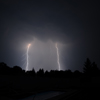Hi Everyone,
I recently moved into a house that has a small one car garage that I am turning into a workshop. The floor of the garage was poured so that there would be concrete under the car tires but the space in between is dirt. I do not want to have any dirt on the floor of my shop so I am digging out the dirt so that concrete can be poured. I am not sure if I will pour the concrete myself but digging a hole is something I can do well. The question that I have is would digging 4" down and poring the concrete strait on the dirt be ok or should I dig deeper and put down gravel bed to put the concrete on?
The electrical problem I have is a frustrating one. The electricity in the garage is all messed up. I when i try to turn on any electrical device the lights go out. It isn't the equipment because the equipment works fine every where else. I did not realize it when I first moved in but the florescent light fixture is even loading down when turned on. I have isolated or unplugged everything and nothing seems to fix the problem.
I have looked at the breaker box and it seems to be wire ok but I have a question, the neutral and ground are identical in the garage's sub panel. Is it supposed to be this way. I thought that in a sub panel the ground and neutral were supposed to be separated. The home inspector didn't mention anything about it so I guess it is ok. I went to HD today to look at breaker boxes and could not fined one where the ground and the neutral can be isolated from each other. I have also redone every electrical connection in the box to see if the breakers, corrosion, or anything else could be the problem. Nothing I did fixed the issue. The only thing that I have not take apart are the wall outlets
Another thing that is strange is the electricity that is coming in. At the main breaker on side reads 74V ac and the other side reads 170V ac. Is this normal or is it odd? I am not sure how accurate the readings are because I am using a $7 harbor freight multimeter.
Any advice that can be given on either issue would be greatly appreciated.
Thanks,
Mike




 Reply With Quote
Reply With Quote


